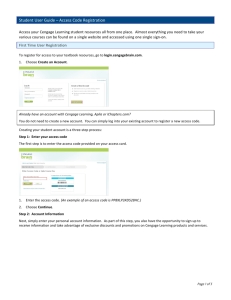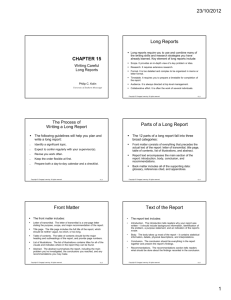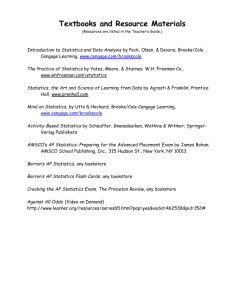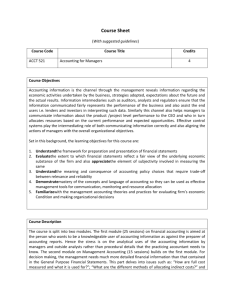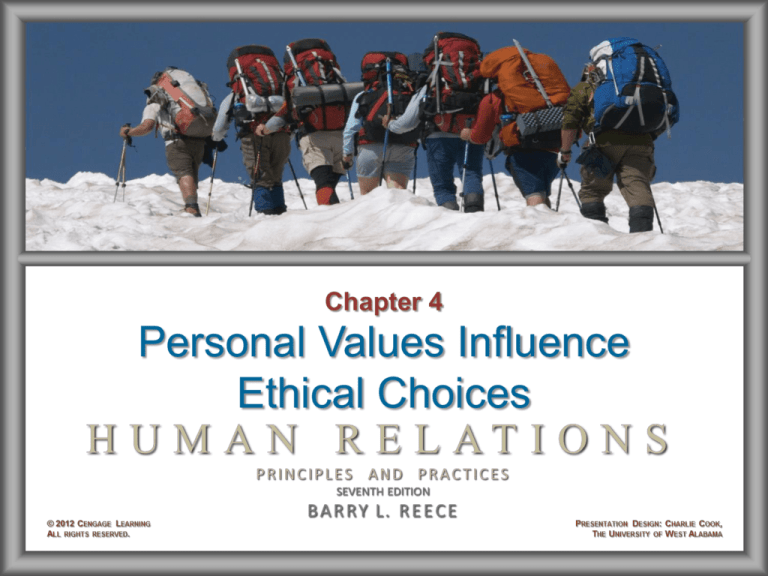
Chapter 4
Personal Values Influence
Ethical Choices
Learning Objectives
After studying Chapter 4, you will be able to:
Explain
the personal benefits of developing a
strong sense of character.
Understand
how personal values are formed.
Understand
values conflicts and how to resolve
them.
Learn
how to make the right ethical decisions
based on your personal value system.
Understand
the danger of corporate crime and
the steps being taken to eliminate it.
© 2012 Cengage Learning. All rights reserved.
4–2
Character, Integrity, and
Moral Development
• Character
– Composed of personal standards of behavior
including honesty, integrity, and moral strength
• Integrity
– Congruence between what you know, what you
say, and what you do
Do you believe character can be
“trained” in school or work courses?
© 2012 Cengage Learning. All rights reserved.
4–3
Importance of Personal Values
• Personal Values
– Are internal beliefs and preferences that
influence a person’s behavior
– Are deep-seated in personality
– Exist at different levels of awareness
– Create an awareness that enhances integrity
© 2012 Cengage Learning. All rights reserved.
4–4
Forming Personal Values
• The Process to Clarify and Develop Values
© 2012 Cengage Learning. All rights reserved.
4–5
TABLE 4.1
A Five-Part Valuing Process to Clarify and Develop Values
Thinking
Feeling
Critical thinking skills help distinguish fact from opinion and supported from
unsupported arguments. Question what you are told. Engage in higher-level
thinking that involves analysis, synthesis, and evaluation.
This dimension of the valuing process involves being open to your “gut level”
feelings. If it doesn’t “feel right,” it probably isn’t. Examine your feelings such as
anger, fear, or emotional hurt. Discover what you prize and cherish in life.
Communicating
Be an active listener. Be constantly alert to communication filters such as
emotions, body language, and positive and negative attitudes. Learn to send
clear messages regarding your own beliefs.
Choosing
In some situations, telling right from wrong is difficult. Therefore, you need to
be well informed about alternatives and the consequences of various courses
of action. Each choice you make reflects some aspect of your value system.
Acting
Act repeatedly and consistently on your beliefs. One way to test whether or not
something is of value to you is to ask yourself, “Do I find that this value is
persistent throughout all aspects of my life?”
© 2012 Cengage Learning. All rights reserved.
4–6
Identifying Your Core Values
• Core Values
– Consistently rank higher than other values
– Are general principles and beliefs that
guide intermediate and long-term goals
– Influence the behavior of
individuals and organizations
© 2012 Cengage Learning. All rights reserved.
4–7
Focus on Your Life’s Purpose
• We often must choose among core values:
– High salary
– Security
– Meaningful work
– Lots of time off
Is it possible to “have it all”?
© 2012 Cengage Learning. All rights reserved.
4–8
Influences That Shape Your Values
Generational
Differences
Your Family
Religious
Groups
Education
Influences
Shaping Values
The Media
People You
Admire
What influencers are shaping the values
of Millennials (Generation Y)?
© 2012 Cengage Learning. All rights reserved.
4–9
TABLE 4.2 People and Events Have Influenced the Formation of Values for
Matures, Baby Boomers, Generation X, and Generation Y (Millennials)
TODAY’S WORK FORCE REPRESENTS THE BROADEST
RANGE OF AGES AND VALUES IN AMERICAN HISTORY.
© 2012 Cengage Learning. All rights reserved.
4–10
How Personal Values Are Formed
• Family
– Parents assume many roles,
including moral teacher
• Religious Groups
– Value priorities often developed
through religious training
What issues do families face that
could challenge the development
of their children’s values?
© 2012 Cengage Learning. All rights reserved.
4–11
How Personal Values Are Formed
• Education
– Some see character education as a
fundamental aspect of education
• People We Admire
– We model the behavior of people we admire
• Media
Who and what dominates TV, movies,
magazines, and other media today?
How is it influencing our values?
© 2012 Cengage Learning. All rights reserved.
4–12
How Personal Values Are Formed
• Avoiding Values Drift
– Values drift is the slow erosion
of core values over time
– Careful examination each day
will help keep values on track
What factors cause values drift?
© 2012 Cengage Learning. All rights reserved.
4–13
Conflicting Values
• Internal Values Conflicts
– Occur when a person must choose
between two or more strongly held values
– Value clarification minimizes conflicts
– Value ranking makes decisions easier
© 2012 Cengage Learning. All rights reserved.
4–14
Values Conflicts
• Bases for Values Conflicts with Others
– Interpretations of work ethics
– Priorities of work life and personal life
• Responses may require compromise
– Helping others with ethical lapses strengthens
human relations skills and personal integrity
© 2012 Cengage Learning. All rights reserved.
4–15
Personal Values and Ethical Choices
• Ethics
– Defines principles for proper behavior when
presented with ethical and moral dilemmas
– Provides a means of evaluating and deciding
among multiple options for right actions
How are ethics different than values?
© 2012 Cengage Learning. All rights reserved.
4–16
Personal Values and Ethical Choices
• Jobs often present ethical dilemmas
• Each organization has different ethical
standards
• Business objectives can create pressures to
violate ethical standards
• “Gray areas” and multiple options can
complicate decisions
– Rarely is there only one right or wrong answer
© 2012 Cengage Learning. All rights reserved.
4–17
An Ethics Questionnaire
• Is it wrong to use
company email for
personal reasons?
• Due to work pressure,
have you ever abused/
lied about sick days?
– 34% said wrong
– 11% said they have
• Is it unethical to
blame an error you
made on a technical
glitch?
– 61% said unethical
© 2012 Cengage Learning. All rights reserved.
• Due to work pressure,
have you ever taken
credit for someone else’s
work or idea?
– 4% said they have
4–18
Achieving Higher Moral Intelligence
Integrity
Compassion
Emotional and
Moral Intelligence
Responsibility
Forgiveness
Ethical Decisions
(Values, Goals, Actions)
© 2012 Cengage Learning. All rights reserved.
4–19
Making the Right Ethical Choices
• Learn to distinguish between right and
wrong
• Don’t let your life be driven by the desire for
immediate gratification
• Make sure your values are in harmony with
those of your employer
© 2012 Cengage Learning. All rights reserved.
4–20
FIGURE 4.1
CMR Institute
Code of Conduct
© 2012 Cengage Learning. All rights reserved.
4–21
How to Prevent Corporate Crime
• Establish and support a strong code of
ethics that considers the best interest of:
– Employees
– Customers
- Stockholders
- The community
• Hire with care
• Provide ethics training
© 2012 Cengage Learning. All rights reserved.
4–22
How to Prevent Corporate Crime
• Develop support for whistleblowing
– Organizations are legally responsible to
support whistle-blowing
– You may be right, win your case, but still
experience emotional and financial turmoil
– Consider the ‘whistleblowing checklist’
© 2012 Cengage Learning. All rights reserved.
4–23
TABLE 4.3
Whistleblower Checklist
1.
Is this the only way?
2.
Do I have the goods?
3.
Why am I doing this?
4.
Am I ready?
© 2012 Cengage Learning. All rights reserved.
4–24
Values and Ethics in
International Business
• Values and ethical choices are more
complicated at the international level
• Global marketplace is ethical minefield
• U.S. companies are a positive role model
© 2012 Cengage Learning. All rights reserved.
4–25
KEY TERMS
character
values conflict
integrity
internal values conflict
values
ethics
core values
codes of ethics
modeling
whistleblower
values drift
© 2012 Cengage Learning. All rights reserved.
4–26

